

James Young (Scottish chemist) James Young (13 July 1811 – 13 May 1883) was a Scottish chemist best known for his method of distilling paraffin from coal.
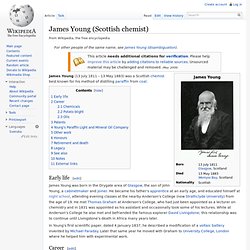
In Young's first scientific paper, dated 4 January 1837, he described a modification of a voltaic battery invented by Michael Faraday. Later that same year he moved with Graham to University College, London where he helped him with experimental work. Portrait bust of James Young, on his gravestone in Inverkip cemetery. In 1839 Young was appointed manager at James Muspratt's chemical works Newton-le-Willows, near St Helens, Merseyside, and in 1844 to Tennants, Clow & Co. at Manchester, for whom he devised a method of making sodium stannate directly from cassiterite. In 1845 he served on a committee of the Manchester Literary and Philosophical Society for the investigation of potato blight, and suggested immersing the potatoes in dilute sulphuric acid as a means of combatting the disease; he was not elected a member of the Society until 19 October 1847. James Young Feature Page on Undiscovered Scotland. James Young lived from 13 July 1811 to 13 May 1883.
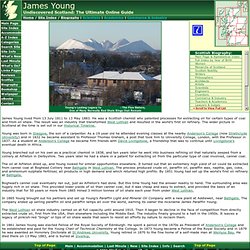
He was a Scottish chemist who patented processes for extracting oil for certain types of coal and from oil shale. The result was an industry that transformed West Lothian and resulted in the world's first oil refinery. The wider picture in Scotland at the time is set out in our Historical Timeline. Young was born in Glasgow, the son of a carpenter. As a 19 year old he attended evening classes at the nearby Anderson's College (now Strathclyde University) and in 1832 he became assistant to Professor Thomas Graham, a post that took him to University College, London, with the Professor in 1837.
Young branched out on his own as a practical chemist in 1838, and ten years later he went into business refining oil that naturally seeped from a colliery at Alfreton in Derbyshire. The oil at Alfreton dried up, and Young looked for similar opportunities elsewhere. Boghead's cannel coal eventually ran out, just as Alfreton's had done. James Young. James Young (1811-1883) was born, on the 13th of July 1811, in the Drygate, Glasgow, the son of a cabinetmaker.
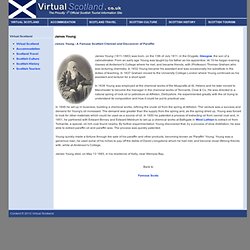
From an early age Young was taught by his father as his apprentice. At 19 he began evening classes at Anderson's College where he met, and became friends, with (Professor) Thomas Graham who was lecturing chemistry. Scotland on Screen - Paraffin Young: Pioneer of Oil (clip 1) This film focuses on the life and work of James Young (1811 - 1883), the pioneer of coal distillation for the production of oil, and the shale oil industry of West Lothian.

Young was a Scottish chemist who patented processes for extracting oil for certain types of coal and from oil shale which resulted in the world's first oil refinery. The film was specially made for screening at the Scottish Oils and Shell Mex Pavilion at the Empire Exhibition of 1938 to highlight Scottish pioneers and showcase Scotland's industrial might.
This clip describes the inventions of the nineteenth century during the industrial revolution including a steelworks, weaving, water wheel. Paraffin. Paraffin wax is a white or colourless soft solid that is used as a lubricant and for other applications.
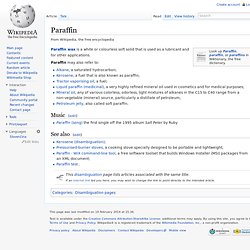
Paraffin may also refer to: Music[edit] See also[edit] Museum of the Scottish Shale Oil Industry. Home > Knowledge > A brief history of shale oil James Young's Bathgate Works Many consider that the world's first commercial scale oil refinery was at Inchcross near Bathgate in central Scotland.
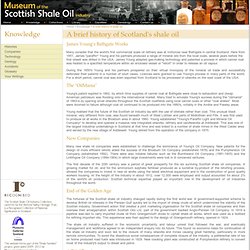
Here from 1851, James "paraffin" Young and his partners produced a range of mineral oils from the local coals, several years before the first oilwell was drilled in the USA. James Young adapted gas-making technology and patented a process in which cannel coal was heated to a specified temperature within an enclosed vessel or "retort" in order to release an oil vapour. During the 1850's Young and his partners prospered on their virtual monopoly of the mineral oil trade and successfully defended their patents in a number of court cases. The "OilMania" Young's patent expired in 1862, by which time supplies of cannel coal at Bathgate were close to exhaustion and cheap American petroleum was flooding onto the international market. New Companies End of the Golden Age.